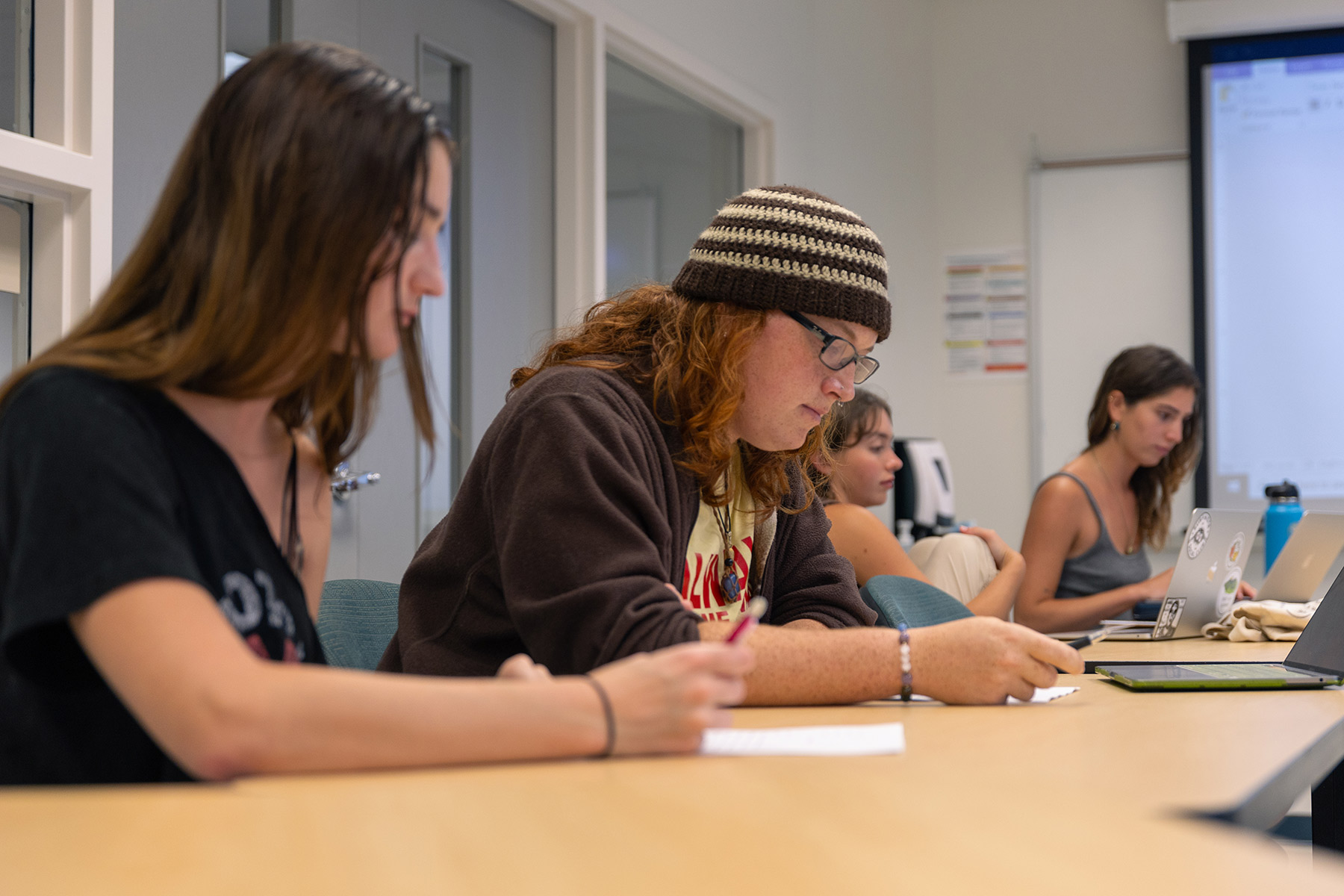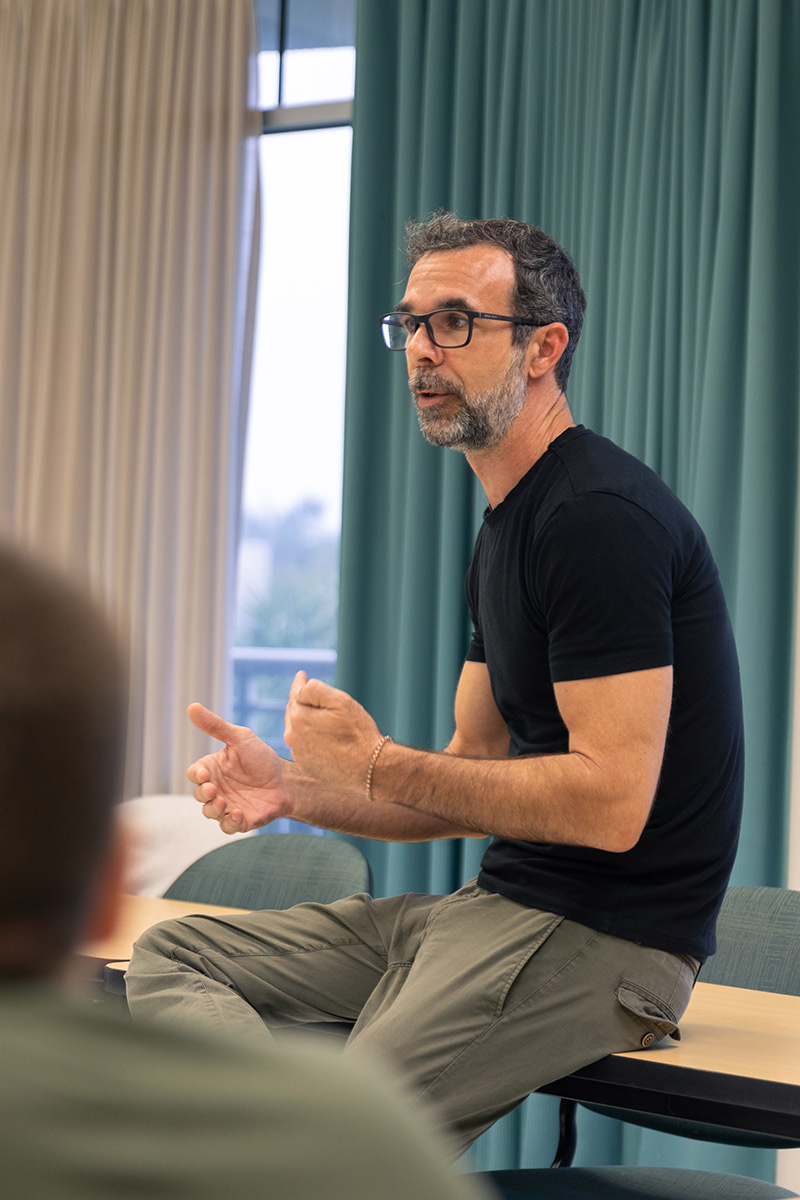The 11th Annual Eckerd College Humanities Research Symposium, slated for April 26 in the Triton Room on the Eckerd campus, is a match made in academic heaven.
The seminar provides students interested in conducting humanities research a supportive workshop environment to address questions about the craft of humanistic research and share findings as an interdisciplinary team.
“Everyone is paired with a different faculty mentor,” explains Adam Guerin, Ph.D., associate professor of history at Eckerd and the leader of the symposium. “It’s a collaborative independent study program that gives students a way to work with humanities scholars and then offers the students a forum to present their research.”
And for the first time, students participate in a weekly class and receive course credit for their work. The class is part of a series of new humanities courses designed to facilitate and direct undergraduate research.
Among the seven students taking part this year is Elianna Tenace, a junior biochemistry and humanities student from Colorado Springs, Colorado. She is working with Charles McCrary, Ph.D., assistant professor of religious studies, and her focus is the Scott Warren case. Warren, currently a professor of geography at the University of Arizona, was tried and aquitted in 2019 of federal charges that he harbored and shielded migrants along the Arizona-Mexico border. What he and others had done was put water jugs in the desert and offer medical help to those who needed it.
“I ordered and read the court transcript,” Elianna explains. “It was a really good thing for Warren to do, but he was prosecuted for it. I’m looking at why that happened and what the implications are. Dr. McCrary and I are consulting with each other at every step of the project. I get great feedback, and he can connect me with other scholars in the field. He set up a Zoom meeting with me and Dr. Dana Lloyd, an assistant professor of global interdisciplinary studies at Villanova University who wrote the book Land Is Kin: Sovereignty, Religious Freedom and Indigenous Sacred Sites.
“One of the benefits of the project is having the final product as a writing sample for graduate school or for further studies,” Elianna adds. “It will be invaluable.”
Sonny Gray, a junior creative writing student from Freeport, Florida, is working with Cameron Hunt McNabb, Ph.D., visiting assistant professor of literature, on how and why the disabilities of noted Greek gods Hephaestus and Oedipus are depicted. Hephaestus is often described as “lame” and “halting.” He was said to have curved feet and had to walk with the aid of a stick. Oedipus, according to mythology, blinded himself after learning he had married his mother.
“They are Greek gods who both have mobility impairments,” Sonny explains. “We’re looking at the different ways they’re depicted. There’s been a lot of scholarship about both of them, focusing on their impairments. One area of disagreement is that the disability is simply a metaphor, as opposed to an actual physical disability.”
The project has already proven rewarding. McNabb says that Sonny’s work “overlaps with my research for a chapter on disability in Oedipus Rex for my current book project Dramatic Prosthesis: Disability and Drama [under contract with University of Michigan Press]. Once their research is done, I plan to cite it for a section of that chapter that deals with depictions of mobility impairment in Greek vases.”
Sonny says they were drawn to the project because they have a chronic illness. “So it’s really important to me. And it’s interesting to go back in history and see how these people with disabilities were depicted. They’ve existed in every culture, and still do. Doing this research will help me be a better student, a better scholarly writer, and I’ll be able to be cited in Dr. McNabb’s book.”
Leah Lentz is a sophomore creative writing and literature student from Medford, New Jersey, who also is the opinion editor for The Current, Eckerd’s student newspaper. She is working with Guerin on a project focusing on how prostitution was depicted in artwork and literature in 19th-century France, and how that depiction changed the public perception of prostitution.
“In the 1860s, prostitution was brought into the French mainstream by artists like Edgar Degas, Henri de Toulouse-Lautrec, Eugène Delacroix and Édouard Manet,” Leah says. “They helped define what was acceptable to the French public and what wasn’t. The French had legalized prostitution from 1804 to 1946, but the laws and attitudes in other countries were different. France is very isolated in its philosophy toward prostitutes and their work.
“I’ve never done a research project before,” Leah adds, “and I’ve learned so much. Prostitution in France in the 19th century created its own lexicon and existed in an opposite space, a place within society that reflected the real world.
“And Dr. Guerin has been very helpful. I don’t speak French, but he does, and it’s great to have someone who cares as much about your work as you do. He really pushes me, but it’s nice because I can feel it paying off.”
The symposium is sponsored by the Eckerd College Letters Collegium.














